Postseason Summary
OCC S1 Div2A
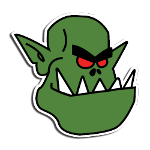
Now that the boots are hung up and the blood washed from the uniforms, it’s that time you have all been waiting for. Time to take a look back at the season that was in all its glory.
Firstly, congratulations to Mongloom for coming out on top and thanks to all of you for a really enjoyable season.
Predictions
For those of you wondering how my preseason predictions hold up in comparison with the actual results, the answer is pretty clear:

Apart from Boys in Capes (damn you jounisii for messing everything up!), no team missed their predicted finishing position by more than two places. Pleasingly, the relative positions of teams seems to have been well predicted (few of the lines above cross over each other). You will remember that my prediction method used the TV difference between the teams as well as the team’s record to predict game outcomes. To test if this combination was useful, I re-ran my simulations using only TV difference or the team’s record and ended up with the following predictions:
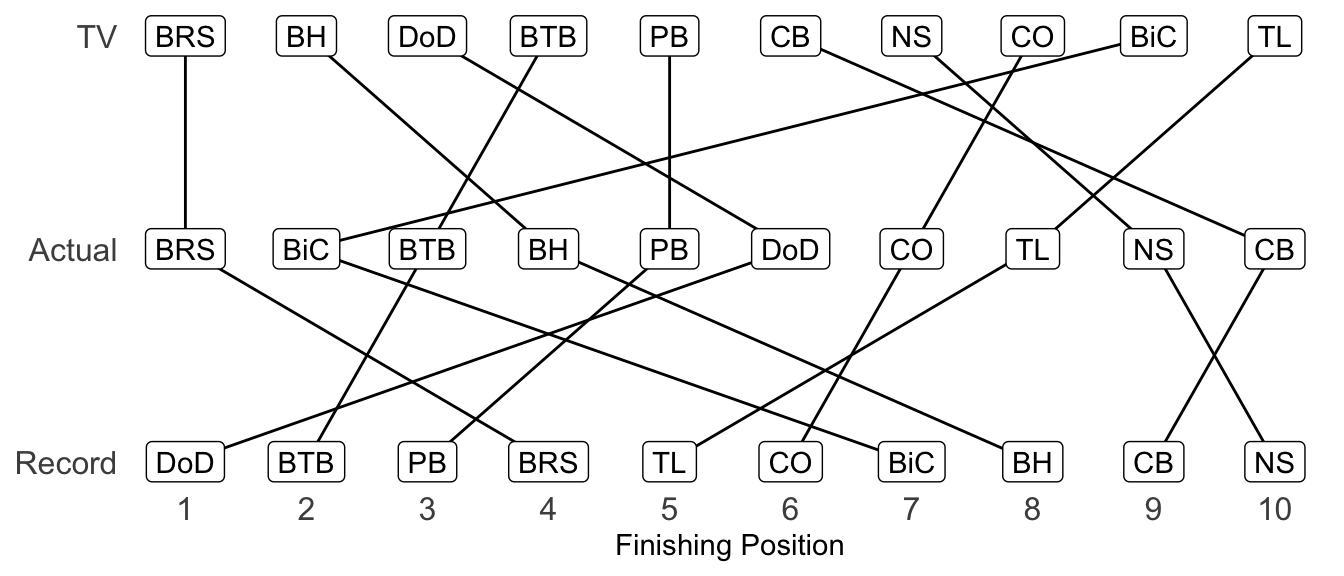
As you can see, these are much messier, suggesting that either method alone is pretty poor at predicting season standings. To confirm this visual impression, we can use a statistical measure that tests for correlation in ranked lists called Kendall’s tau. This score ranges from -1 to 1 with a 1 representing perfectly correlated lists. For our predictions, the tau coefficients are 0.51 for the combined method, 0.33 for TV difference and 0.28 for a team’s record. Only the combined prediction method has a statistically significant correlation, implying that using only TV difference or a team’s record is no better than guessing finishing positions randomly.
So with the season out of the way, I thought it would be nice to recognise the players that made the biggest impact in the division (for better or worse). While the basic stats can now be easily accessed thanks to doneagle’s tireless work, I’ve decided to take a look at some more unconventional metrics to assess a player’s contribution.
The Brawler Award
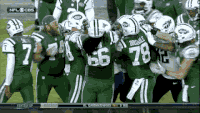
Sometimes, you just need a player willing to throw themselves headfirst into a scrum and start knocking heads together. We measure a player’s brawler score at the end of their team’s turn as one point for each based opposition player and two points for each based opponent who is lying on the ground. Excluding players who have not spent the equivalent of a full game on the pitch, the biggest brawlers in the division end up with an average score of ~2 meaning they are effectively basing two opponents or one downed opponent every turn they are on the pitch. It’s no surprise that Big Guys are highly represented using this metric, but congratulations go to Malodour from dode74’s Clockwork Orkage who tops the table with an average brawler score of 2.35. With his Stand Firm skill, once he is in place tying up many opposition players he can be difficult to get away from.
| Player | Team | Brawler Score | # Games |
|---|---|---|---|
| Malodour | Clockwork Orkage | 2.35 | 5.6 |
| Varanus | Blue-tongued Bruisers | 2.21 | 3.6 |
| F1 Varanus | Blue-tongued Bruisers | 2.16 | 2.5 |
| Dara Ó Briain | Party Blockers | 2.10 | 7.5 |
| Gordito | Toro Loco | 2.09 | 8.9 |
| Icemelter | Cold beards | 2.08 | 5.4 |
| Rodge | Party Blockers | 2.08 | 8.9 |
| Stanley H. Tweedle | Do or Die… | 2.07 | 7.9 |
| Alberto Garcia | Toro Loco | 2.05 | 1.4 |
| Pogona | Blue-tongued Bruisers | 1.98 |
7.7 |
The Pansy Elf Award
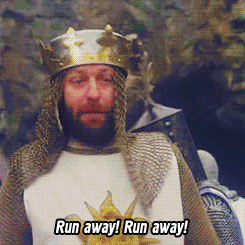
At the other end of the scale from the brawlers, there are those players that prefer to do their own thing. Preferably far away from the other team. To identify these players we take the average distance between a player and all opposition players at the end of their team’s turn (straight line distance, so ignoring tackle zones and blocking players etc.). If we average this distance over every turn the player is on the pitch, we get a measure of how far away from the bulk of the other team a player usually is. Again, excluding players with less than a game on the pitch we find the thrower Birdy Wazzit from Verbal_HM’s Natural Synergy topping the leaderboard, keeping an average of nearly 7 squares away from the opposition at all times.
| Player | Team | Average Dist. | # Games |
|---|---|---|---|
| Birdy Wazzit | Natural Synergy | 6.73 | 5.4 |
| Thor | Boys in Capes | 6.49 | 8.4 |
| Slippy Peggit | Natural Synergy | 6.21 | 4.9 |
| Lerista | Blue-tongued Bruisers | 5.70 | 7.9 |
| Taboo | Black House | 5.67 | 8.3 |
| Fumbles | Party Blockers | 5.66 | 6.1 |
| Moocho Jin | Black House | 5.65 | 8.2 |
| Florin | Natural Synergy | 5.59 | 5.7 |
| Koko | Cold beards | 5.58 | 6.7 |
| Hektor Mercedes | Toro Loco | 5.57 | 6.6 |
The Unstoppable Force Award
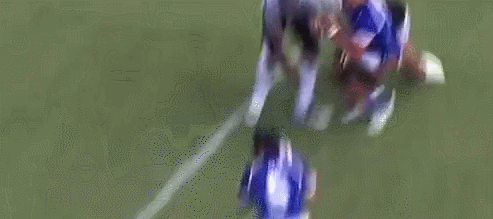
The blitz is an important action in Blood Bowl. It may be the only block you can get some turns, so it’s important to make it count. The choice of blitzer is just as important. You need someone you can trust to get the job done, so blitzers are often afforded a special place in any coach’s heart. So who is most often called upon to take a running dive at the opposition? The answer might surprise you, with over 50% of blitzes for Boys in Capes being performed by the catcher Storm. Perhaps we should not be surprised however, with the only Mighty Blow on the team Storm provides the main aggressive force. Special mention goes to the Werewolves Inferno and Mayhem. With identical skill builds, these two were called upon nearly equally to blitz taking about 30% of Black House’s blitz actions each. I wonder if this was an injury management strategy by Buzkill to ensure their longevity in the game.
| Player | Team | # Blitzes | % of Team |
|---|---|---|---|
| Storm | Boys in Capes | 64 | 51.6 |
| Edgar Valverde | Toro Loco | 54 | 46.2 |
| Molly Malone | Party Blockers | 46 | 37.1 |
| Chlamydosaurus | Blue-tongued Bruisers | 44 | 35.8 |
| Seventh son of a 7th son | Blood Red Skies | 43 | 33.9 |
| Craic Dealer | Party Blockers | 40 | 32.3 |
| Inferno | Black House | 35 | 29.9 |
| Mayhem | Black House | 32 | 27.4 |
| Icemelter | Cold beards | 31 | 27.0 |
| Bulk | Natural Synergy | 31 | 25.2 |
The Removable Object Award

Not every player has a glamorous job out on the field. Sometimes, you need cannon fodder to throw in dangerous situations regardless of the personal risk. Even being knocked out of the game can be a success if you tie up the opposition’s star blitzer for a turn. This award recognises the unsung heroes of a team who do what needs to be done regardless of the consequences (requiring more than one game played to weed out journeymen who skew the results). The recipient of this award is the lineman Flaw from Natural Synergy, who has spent 96.8% of his game time stunned or worse. Poor flaw has only joined the team for the last two games of the season, and spent nearly the entirety of the first knocked out and was injured for the second. We wish him the best in recovery and hope he can find a safer role to play soon. An honourable mention must go to Svemole’s Cold Beards for this award, with four of the top ten players in this category. These players spent an average of 50% of the game out of action, showing just how hard life can be as an AV7 team.
| Player | Team | % of Turns Stunned or Worse |
|---|---|---|
| Flaw | Natural Synergy | 96.8 |
| Ofeig Gesturson | Cold beards | 76.6 |
| Frey Geirson | Cold beards | 45.6 |
| Erugoldur Malyatinu | Boys in Capes / Blood Red Skies | 44.9 |
| Parados | Natural Synergy | 40.2 |
| Scattcat | Cold beards | 39.1 |
| Bellatorias | Blue-tongued Bruisers | 38.3 |
| Class | Black House / Natural Synergy | 36.2 |
| Batman | Boys in Capes | 36.0 |
| Kalle | Cold beards | 34.4 |
The Butterfingers Award
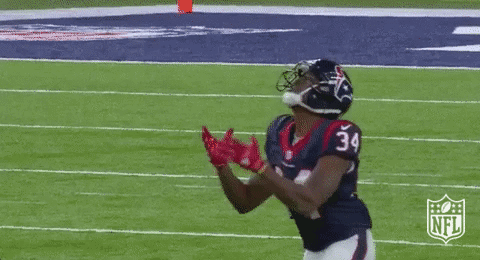
At the end of the day, it’s getting the ball to the end zone that counts, so ball handling skills are essential for any team. The players who score TDs and complete passes and catches are easily found on the main stats page, but what about those who are less than successful? This award recognises players who should head to the training ground in the off season to practice their pickups, passes or catches. We measure both the number of failed dice rolls for these actions as well as the number of failed actions (resulting in turnovers) for each player. To remove players who are only called on in emergencies, we will limit this award to players who make at least nine ball handling attempts (an average of once per game). I’m not sure how he even made it here, but the award for the least successful ball handler goes to the Black Orc Derp from Francach’s Party Blockers. Derp just scrapes onto the list with seven failures from nine ball handling attempts. I guess when you have a Black Orc with just Dodge, you are pretty keen to feed him TDs so he finally becomes useful! The benefit of reroll skills can be seen clearly by comparing the 2nd, 3rd and 4th players on the list. While the ghoul Taboo and the throwers Birdy Wazzit and Fumbles all have failed about 60% of dice rolls for ball handling attempts, the Pass/Sure Hands combination on the throwers means that they only turn the ball over about 40% of the time, rather than 60% for the ghoul.
| Player | Team | % Failed Rolls | % Failed Actions |
|---|---|---|---|
| Derp | Party Blockers | 86.7 | 77.8 |
| Taboo | Black House | 66.7 | 58.8 |
| Birdy Wazzit | Natural Synergy | 59.1 | 38.5 |
| Fumbles | Party Blockers | 58.3 | 37.5 |
| Anomalopus | Blue-tongued Bruisers | 57.1 | 45.5 |
| Hektor Mercedes | Toro Loco | 51.6 | 36.4 |
| Slippy Peggit | Natural Synergy | 48.1 | 33.3 |
| Lerista | Blue-tongued Bruisers | 47.6 | 28.6 |
| Morkk | Clockwork Orkage | 44.4 | 33.3 |
| Thor | Boys in Capes | 39.5 | 18.5 |
The Snakes on a Field Award
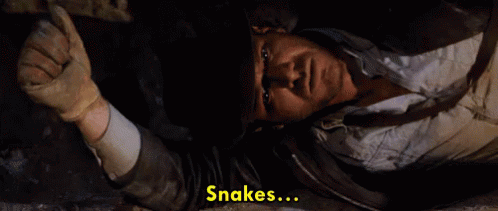
The one thing every coach dreads. Rolling snake eyes or double skulls is the fastest way to bring your drive to a crashing halt and leave your plans in ruins. We will collect these stats at the team level, however special mention goes to Spawn and Thor from Boys in Capes, Lerista from the Blue-tongued Bruisers and Edgar Valverde, the AG4 blitzer from J.J. Cash’s Toro Loco, who each rolled four double ones across the season. The skill of the Boys in Capes is evident from their ability to come second despite rolling the most snakes in the division. The second and third teams on the list ended up in the last two spots on the ladder, showing that when Nuffle decides your time is come, there is not a lot you can do about it. Speaking of Nuffle, we should clearly be working out what sacrifices Waleed has been making because Do or Die finish with the lowest total by far.
| Team | # Snakes |
|---|---|
| Boys in Capes | 20 |
| Cold beards | 18 |
| Natural Synergy | 17 |
| Blood Red Skies | 15 |
| Clockwork Orkage | 15 |
| Black House | 13 |
| Blue-tongued Bruisers | 13 |
| Party Blockers | 13 |
| Toro Loco | 12 |
| Do or Die… | 5 |
I hope you’ve enjoyed this little wrap up for the season. There have been highs and lows, but I’ve had fun every step of the way. I will be taking a little break from the league, but best of luck to those continuing. I look forward to seeing you all again soon in season 3 or 4.
Update 28 / 04
Comment from Ethelred on the OCC forums:
the stat I’m waiting for is fairly pedestrian - the number of fouls committed!
With only one team really built around fouling, this award was never really in doubt. Perhaps more interesting is which team was considered enough of a threat to be worth fouling by coaches other than Mongloom.
| Team | Fouls committed | Team | Fouls received |
|---|---|---|---|
| Blood Red Skies | 48 | Boys in Capes | 27 |
| Boys in Capes | 15 | Party Blockers | 20 |
| Clockwork Orkage | 12 | Black House | 14 |
| Toro Loco | 9 | Blue-tongued Bruisers | 10 |
| Natural Synergy | 8 | Clockwork Orkage | 10 |
| Blue-tongued Bruisers | 7 | Cold beards | 9 |
| Cold beards | 5 | Natural Synergy | 9 |
| Party Blockers | 4 | Toro Loco | 8 |
| Do or Die… | 3 | Do or Die… | 5 |
| Black House | 2 | Blood Red Skies | 1 |
Taking a look at the player-by-player breakdown we can see that Blood Red Skies’ two Dirty Player/Sneaky Git specialists were used to their full potential. Most other players were used sparingly and only where likely to succeed, however these two appear to have been thrown at just about any player on the floor. Of the seven players with more than two fouls, these two take a strong lead. Their eagerness to put the boot in has resulted in them also having pretty poor success rates as they take an opportunistic foul whether support is there or not.
| Player | Team | # Fouls | Success (%) | Ejection rate (%) |
|---|---|---|---|---|
| Titus Vigor | Blood Red Skies | 23 | 47.8 | 30.4 |
| Julian Caronte | Blood Red Skies | 16 | 37.5 | 12.5 |
| Tûrciniien Hadilinas | Boys in Capes | 12 | 66.7 | 25.0 |
| Badoth | Clockwork Orkage | 5 | 60.0 | 0.0 |
| Parados | Natural Synergy | 4 | 50.0 | 25.0 |
| Bellatorias | Blue-tongued Bruisers | 3 | 66.7 | 0.0 |
| Kras’gors | Blood Red Skies | 3 | 33.3 | 33.3 |

Share this post
Twitter
Google+
Facebook
Reddit
LinkedIn
StumbleUpon
Email